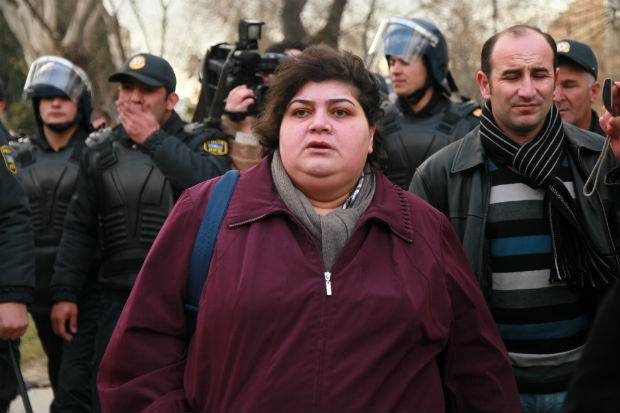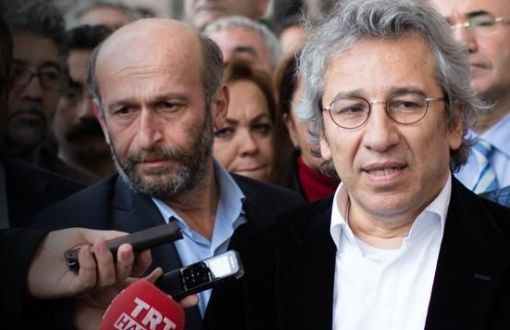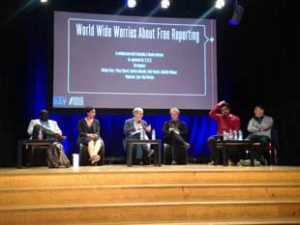Index relies entirely on the support of donors and readers to do its work.
Help us keep amplifying censored voices today.

Khadija Ismayilova is one of the government critics jailed ahead of the 2015 Baku European Games.
Index on Censorship calls for all Khadija Ismayilova’s convictions to be quashed following the reduction in her jail sentence to a three-and-a-half-year suspended term.
Ismayilova, an award-winning journalist, was imprisoned since December 2014 and sentenced in September 2015 to seven-and-a-half years in prison on trumped-up charges.
“Khadija is a courageous journalist who speaks truth to power despite relentless harassment and pressure,” said Index on Censorship’s senior advocacy officer Melody Patry. She added: “Her imprisonment was unjust and the Supreme Court should have gone further and overturned the conviction rather than merely reducing the sentence.”
Officially charged with large-scale misappropriation and embezzlement, illegal entrepreneurship, tax evasion and abuse of official duties, the real reason for Ismayilova’s imprisonment is her investigative journalism and advocacy.
Although Ismayilova is out of jail, her conviction still stands and carries many restrictions on her freedoms. She will have to report herself to the police every month and won’t be able to leave the country for five years without a permission from state institutions, Azadliq Radiosu reports.
“The struggle is not over for Khadija Ismayilova, and it is certainly not over for the remaining political prisoners in Azerbaijan,” Index’s CEO Jodie Ginsberg said. “Substantial change and reform are needed so that the authorities cannot jail and free their critics as they please.”
Index on Censorship will take part in the Sport for Rights global action to mark Ismayilova’s 40th birthday on Friday 27 May. Gatherings across the globe will go ahead, and participants will celebrate Ismayilova’s release and call for the release of the country’s dozens of remaining political prisoners.
Azerbaijan: Journalist Khadija Ismayilova released from prison
Journalists have been murdered and burned in effigy. Reporters have been publicly discredited by government officials, prosecuted for under anti-terrorism laws and excluded from public meetings on the refugee crisis. We’ve even recorded journalists being menaced with mechanical diggers.
Mapping Media Freedom launched to the public on 24 May 2014 to monitor media censorship and press freedom violations throughout Europe. Two years on, the platform has verified over 1,800 incidents, ranging from insults and cyberbullying to physical assaults and assassination.
“The original impetus behind the project was to uncover everyday attacks on press freedom in Europe. The database has given Index, its partners and policy makers a highly unnerving look at the ways journalists are barred, attacked or even murdered simply for doing their jobs,” Hannah Machlin, project officer for Mapping Media Freedom, said.
The project has been granted renewed funding by the European Commission.
“The strength of Mapping Media Freedom is that it provides an ongoing narrative about the state of press freedom in the European region. It is gratifying that the European Commission values its contribution to the project by renewing its funding for a third year,” Melody Patry, senior advocacy officer, Index on Censorship said.
Over the period of coverage, Mapping Media Freedom has released periodic reports on the verified incidents. In the first quarter of 2016, the project received a total of 301 violations of press freedom to the database, a 30% rise over the fourth quarter of 2015. Earlier reports documented similar trends: February 2016, October 2015, May 2015 and December 2014.
The platform — a joint undertaking with the European Federation of Journalists and Reporters Without Borders and partially funded by the European Commission — covers 40 countries, including all EU member states, plus Albania, Belarus, Bosnia, Iceland, Kosovo, Macedonia, Montenegro, Norway, Russia, Serbia, Turkey, Ukraine and Azerbaijan. In September 2015 the platform expanded to monitor Russia, Ukraine and Belarus and in February 2016 into Azerbaijan. Since launching in May 2014, the map has recorded over 1,800 violations of media freedom, as 17 May 2016. Each report is fact checked with local sources before becoming publicly available on the interactive map.
Mapping Media Freedom works in conjunction with the Council of Europe’s platform about the safety and protection of journalists, provides resources for researchers and information for journalists. It is also affiliated with European Youth Press, Media Legal Defence Initiative, Human Rights House Kiev, Ossigeno per L’Informazione, Osservatorio Balconi e Caucaso and the European Centre for Press and Media Freedom.
Mapping Media Freedom
|

Journalists Erdem Gül and Can Dündar in November 2015 (Photo: Bianet)
The sentencing of journalists Can Dündar and Erdem Gül to years in prison for sharing state secrets underscores how Turkey’s government is crushing critical voices. The trial follows Dündar and Gül’s investigative reporting on links between the Turkish intelligence services and arms to Islamist groups in Syria. Dundar has been sentenced to five years and 10 months, and Gul to five years.
Index on Censorship condemns this clearly political ruling and calls for an end to judicial harassment of Dündar, Gül and all journalists in the country. The country’s drastic decline has been well documented by Index’s Mapping Media Freedom project and Reporters Without Borders’ World Press Freedom Index. The closure of the seized Zaman newspaper group is only one recent example of the government’s draconian attitude toward independent media.
“The Turkish government is now resorting to locking up journalists like Dündar and Gül, who sought to reveal information of public interest, something journalists around the world do every day. Yet they are paying a heavy price. The sentencing is an example of an ongoing decline in Turkey’s attitude to freedom. It has entered a new dark age where the truth is forbidden and even a hint of dissent is not tolerated,” Melody Patry, senior advocacy officer, Index on Censorship, said.
From the outset of the case in November 2015, Dündar, the editor-in-chief of daily newspaper Cumhuriyet, and Gül, head of the paper’s Ankara bureau, were accused of spying and terrorism after the paper published evidence in May 2015 of Turkey’s intelligence services’ involvement in Syria’s civil war. In the wake of the revelations, Recep Tayyip Erdogan, president of Turkey, publicly declared that Dundar and his paper “will pay for this”.
Dündar nearly paid with his life. Shortly before a court issued his sentence, a man identified in Daily Sabah as Murat Şahin attempted to shoot the editor, but was thwarted by the intervention of Dundar’s wife and an onlooker.
Both Dündar and Gül are free on bail as they appeal their sentences.

L-R Antoine Kaburahe, Melody Patry, Jean-Paul Marthoz, Thierry Chervel, Abdualla Maksour and Rudi Vranckx discuss world wide worries about free reporting
This week’s Difference Day conference in Brussels was all about celebrating press freedom. “Should we instead mourn press freedom?” asked Jean-Paul Marthoz, EU correspondent for the Committee to Protect Journalists.
Journalists and media professionals from across the world attended the World Press Freedom Day event at the Bozar Centre for Fine Arts on 3 May.
Marthoz was joined at the World Wide Worries About Free Press debate by Index on Censorship’s senior advocacy officer Melody Patry, journalist Thierry Chervel, founder and director of Burundi-based newspaper IWACU Antoine Kaburahe, conflict journalist Rudi Vranckx, and Syrian journalist and novelist Abdualla Maksour.
Patry drew attention to the work of those who fight to protect press freedom. She said although she can understand the position of “pessimists among us today”, having “a day to celebrate journalism and the free press already shows that we are attached to the idea that we need to support and protect the standards of journalism across the world, and highlight the work of journalists who are imprisoned and even killed for reporting the news”.
Conflict journalist Rudi Vranckx was less optimistic. He told of how every translator he worked with in Iraq, Syria, Gaza and Egypt has since been forced to flee their home.
Vranckx’s concerns were shared by Maksour who, holding a sign with the Aleppo is burning hashtag, highlighted the situation in Syria, stating that 15 civilians had died there on that morning alone.
“You can’t find a foreign journalist out there because it is very dangerous – they will be arrested or be killed,” said Maksour, adding that the situation prevents us from seeing the real picture of what is going on in Syria.
In an earlier debate, EU Media, Censorship and Propaganda, Patry introduced Index on Censorship’s Mapping Media Freedom project and took part in a discussion with Marthoz, Jakub Kalensky of the East StratCom Task Force and Maria Donde, Ofcom’s international policy manager.
The debate focused on ways to counter propaganda with information that is readily and safely available for anyone, so that people can make up their own mind.
“People, of course, should have access to as wide a range of information as possible, but what’s continually important is for them to have critical understanding to be able to tell the difference between a fabricated, exaggerated, poorly sourced story and what is a credible news source,” Donde said.
Patry, agreeing with Donde, suggested people shouldn’t necessarily believe everything they see on the TV. “Journalists doing a good job, verifying sources, and verifying information is also part of improving the wider environment for press freedom and pluralism in Europe,” she added.
Difference Day showed that press freedom never comes without challenges. It may be time to ask ourselves seriously: is it time to mourn or celebrate?